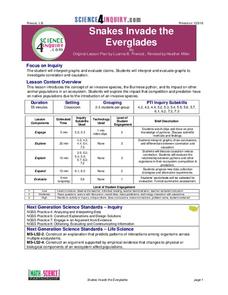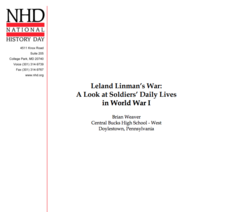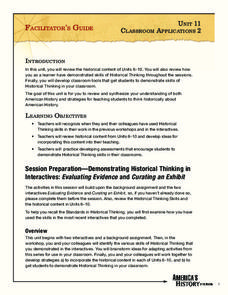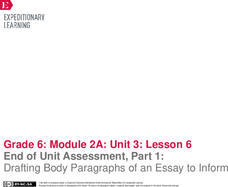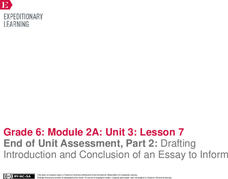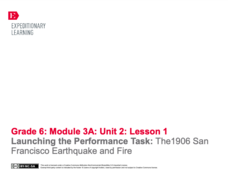Illinois Mathematics and Science Academy
A Search for Symbolism in The Great Gatsby
After reading The Great Gatsby, groups return to the text and note passages where Fitzgerald uses symbols and color imagery in his narrative. They then develop a presentation that explains the context, the implications, and possible...
What So Proudly We Hail
A Lesson on Benjamin Franklin’s “Project for Moral Perfection”
Benjamin Franklin identified 13 virtues that he felt would strengthen his character if he could focus on each one. A thorough lesson explores high schoolers' personal values in the context of their lives, and compels them to strive for...
Science 4 Inquiry
Snakes in the Everglades
The Burmese python is on the loose ... and he's hungry! Illustrate the differences between causative and correlative relationships through an inquiry instructional activity. Pupils examine several sources of information to determine if...
Howard Hughes Medical Institute
Zebrafish and Skin Color
You may not know if that zebrafish in your fish tank is a model citizen—but it is definitely a model organism! What can we learn about ourselves from a tiny zebrafish? Discover more about the polygenic trait of skin color through a...
Howard Hughes Medical Institute
Stalking the Genetic Basis of a Trait
Need an a-maize-ing lesson to show your class how regulatory genes work? If you use the well-written resource, they'll be all ears! Biology scholars discover the gene responsible for the evolution of the modern-day corn plant through a...
National History Day
Leland Linman’s War: A Look at Soldiers’ Daily Lives in World War I
Hunkering down in the trenches of World War I, Leland Linman decided to write a journal about his experiences. By reading Linman's entries in the fourth installment of an eight-part lesson series, scholars get a firsthand look at life in...
Teaching Children Philosophy
Tiger-Tiger, is it True?
Scholars take part in a philosophical discussion about truth, thoughts, and feelings following a reading of Tiger-Tiger is it True? by Byron Katie and Hans Wilhelm.
California Department of Education
Who Am I?
Get in touch with your sense of self! The fifth and final instructional activity in a series of college and career lessons for fifth graders reinforces the relationship between interests and career choices. Pupils play a scenario-driven...
Annenberg Foundation
America's History in the Making: Classroom Applications Two
Reading between the lines helps discover important information! The 11th lesson of a 22-part series on American history has scholars use historical thinking skills to uncover the deeper meaning behind the words on a page. Using backward...
Society for Science & the Public
Easter Islanders Made Tools, Not War
When studying artifacts, especially tools, how do archaeologists determine what the devices were used for? In what ways might researchers' previous experiences influence their perception of an artifact? An article about researchers'...
California Academy of Science
The Heat is On: Cause and Effect and Climate
The higher the number of letters in the final word for the National Spelling Bee, the higher the number of people killed by venomous spiders. Obviously, those two facts correlate, but no causation exists. Scholars view data based on...
Complete College America
The Marshmallow Reading/Writing Project
Which option would most children choose: One marshmallow now, or two marshmallows in 10 minutes? Learners watch the social experiment on video and discuss their observations. They then read articles and work in small groups to analyze...
Howard Hughes Medical Institute
Lactose Intolerance: Fact or Fiction
Around the world, about 2/3 of adult humans are lactose intolerant. Scholars work in small groups to discuss a few statements about lactose intolerance. Then, they watch a video on the topic and readdress each statement. Whole-class...
Ford's Theatre
How Perspective Shapes Understanding of History
The Boston Massacre may be an iconic event in American history, but perhaps the British soldiers had another point of view. Using primary sources, including reports from Boston newspapers and secondary sources from the British...
EngageNY
Reading Proficiently and Independently: The Power of Setting Goals
Scholars reflect upon their reading strengths and challenges to create personal reading goals. Participants use goal-setting verbiage in an accordion-style graphic organizer, a first step in writing a letter that details their reading...
California Education Partners
Quest for Tree Kangaroo
A three-day assessment challenges scholars to read a passage from an informational text then complete two activities that lead to a writing assignment. Day one and two begin as readers independently read a passage and tag the most...
EngageNY
End of Unit Assessment: Tracing and Evaluating Arguments
Give water the attention it deserves. Scholars watch Corporations Need to Pay More Attention to Water and respond to questions as part of their end of the unit assessment. They then complete the assessment by reading and responding to...
EngageNY
Analyzing the Structure and Content of an Essay to Inform
Outlines are a great asset to essay planning. Scholars read and analyze a model essay about the importance of daily reading and consider how it would look in an outline format. Next, they outline their own informative essays about rules...
EngageNY
End of Unit Assessment, Part 1: Drafting Body Paragraphs of an Essay to Inform
Anybody can write a body paragraph! Pupils analyze the development of ideas in a body paragraph from a model essay. Next, using what they've learned, they draft the body paragraphs of their My Rule to Live By informative essay.
EngageNY
End of Unit Assessment, Part 2: Drafting Introduction and Conclusion of an Essay to Inform
A powerful introduction and conclusion can really pack a punch. Using the resource, scholars first read and discuss a model essay. Then, as part of the end of unit assessment, they draft the introductory and concluding paragraphs of...
EngageNY
Launching the Performance Task: The1906 San Francisco Earthquake and Fire
Picture that! Pupils view photographs of the aftermath of the 1906 San Francisco earthquake and fire, discussing what they know and wonder about each image. Then, scholars watch a short video about the historic event and complete a KWL...
Scholastic
Hopes and Dreams
A lesson encourages mini scholars in setting goals. Peers share their hopes and dreams and discuss how each one adds to everyone's unique character. Class members draw themselves in a scene achieving a goal. A follow-up meeting allows...
EngageNY
Using Multiple Resources of Information: Creating a Cascading Consequences Chart about DDT and Practicing a Fishbowl Discussion
For every action there is a consequence. Scholars continue their work on creating a cascading consequence chart about DDT using Welcome Back, The Exterminator, Rachel Carson: Sounding the Alarm on Pollution along with graphic organizers...
EngageNY
Group Discussions and Revision: Editorial Essay
Great minds think aloud! Pupils participate in the Fishbowl protocol, discussing their opinions about the Mary River mine proposal. As they share their thoughts, peers provide feedback about their thesis and supporting ideas.
Other popular searches
- Evidence of Evolution
- Evidence for Evolution
- Citing Textual Evidence
- Textual Evidence
- Evidence for Plate Tectonics
- Supporting Evidence
- Continental Drift Evidence
- Archaeological Evidence
- Dna Evidence for Evolution
- Cite Evidence in Text
- Evidence for Geologic Time
- Indirect Evidence




